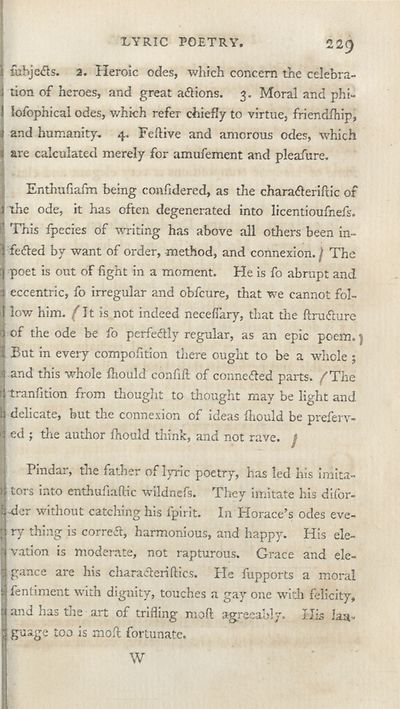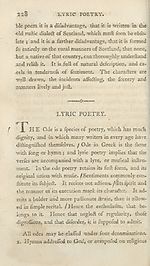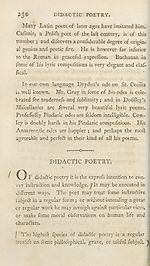Download files
Complete book:
Individual page:
Thumbnail gallery: Grid view | List view

'LYRIC POETRY. 229
tubje&s. a. Heroic odes, which concern the celebra¬
tion of heroes, and great actions. 3. Moral and phi-
lofophical odes, which refer chiefly to virtue, friendfliip,
and humanity. 4. Feftive and amorous odes, which
are calculated merely for amufement and pleafure.
Enthufiafm being confidered, as the chara&eriftic of
the ode, it has often degenerated into licentioufnefs.
This fpecies of writing has above all others been in-
fefted by want of order, method, and connexion. / The
poet is out of fight in a moment. He is fo abrupt and
eccentric, fo irregular and obfcure, that we cannot fol¬
low him. ^It is not indeed neceflary, that the ftrufture
of the ode be fo perfedtly regular, as an epic poem.)
But in every compofition there ought to be a whole ;
and this whole Ihould confift of connefted parts. /'The
tranfition from thought to thought may be light and
delicate, but the connexion of ideas (hould be preferv-
ed ; the author fhould think, and not rave, j
Pindar, the father of lyric poetry, has led his imita¬
tors into enthufiaftic wildnefs. They imitate his difor-
-der without catching his fpirit. In Horace’s odes eve¬
ry thing is correft, harmonious, and happy. His ele¬
vation is moderate, not rapturous. Grace and ele-
igance are his charafteriftics. He fupports a moral
fentiment with dignity, touches a gay one with felicity,
and has the art of trifling moft agreeably. His lan¬
guage too is moft fortunate.
W
tubje&s. a. Heroic odes, which concern the celebra¬
tion of heroes, and great actions. 3. Moral and phi-
lofophical odes, which refer chiefly to virtue, friendfliip,
and humanity. 4. Feftive and amorous odes, which
are calculated merely for amufement and pleafure.
Enthufiafm being confidered, as the chara&eriftic of
the ode, it has often degenerated into licentioufnefs.
This fpecies of writing has above all others been in-
fefted by want of order, method, and connexion. / The
poet is out of fight in a moment. He is fo abrupt and
eccentric, fo irregular and obfcure, that we cannot fol¬
low him. ^It is not indeed neceflary, that the ftrufture
of the ode be fo perfedtly regular, as an epic poem.)
But in every compofition there ought to be a whole ;
and this whole Ihould confift of connefted parts. /'The
tranfition from thought to thought may be light and
delicate, but the connexion of ideas (hould be preferv-
ed ; the author fhould think, and not rave, j
Pindar, the father of lyric poetry, has led his imita¬
tors into enthufiaftic wildnefs. They imitate his difor-
-der without catching his fpirit. In Horace’s odes eve¬
ry thing is correft, harmonious, and happy. His ele¬
vation is moderate, not rapturous. Grace and ele-
igance are his charafteriftics. He fupports a moral
fentiment with dignity, touches a gay one with felicity,
and has the art of trifling moft agreeably. His lan¬
guage too is moft fortunate.
W
Set display mode to:
![]() Universal Viewer |
Universal Viewer | ![]() Mirador |
Large image | Transcription
Mirador |
Large image | Transcription
| Antiquarian books of Scotland > Languages & literature > Abridgement of lectures on rhetoric > (245) |
|---|
| Permanent URL | https://digital.nls.uk/135469394 |
|---|
| Description | Thousands of printed books from the Antiquarian Books of Scotland collection which dates from 1641 to the 1980s. The collection consists of 14,800 books which were published in Scotland or have a Scottish connection, e.g. through the author, printer or owner. Subjects covered include sport, education, diseases, adventure, occupations, Jacobites, politics and religion. Among the 29 languages represented are English, Gaelic, Italian, French, Russian and Swedish. |
|---|

